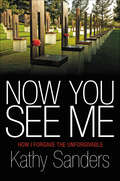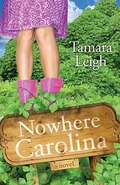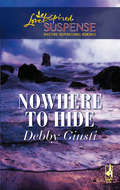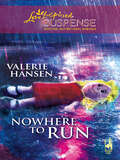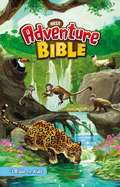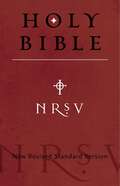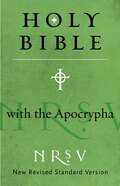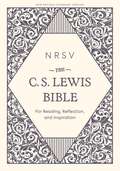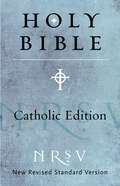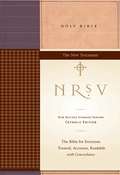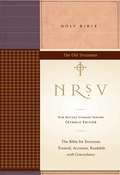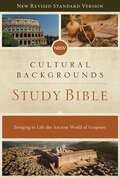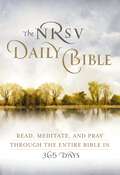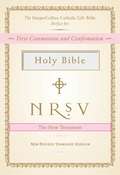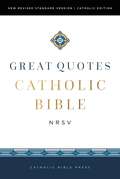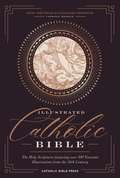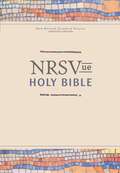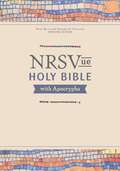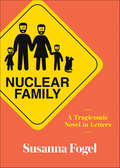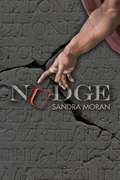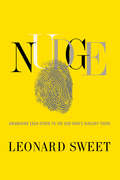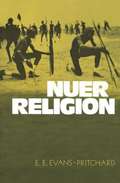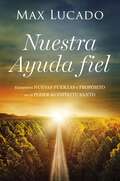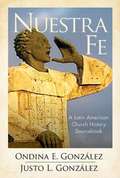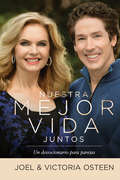- Table View
- List View
Now You See Me: How I Forgave the Unforgivable
by Kathy SandersOn April 19, 1995, Kathy Sanders' life was changed forever when a bomb exploded and destroyed the Alfred P. Murrah building in Oklahoma City, killing her two grandsons Chase and Colton. For months, Kathy struggled with coping and wondered if the God she'd worshipped all her life even existed. After battling bitterness and contemplating suicide, she turned to the Lord and asked what He'd have her do. The answer was clear: Forgive your enemies. Thus Kathy forged a friendship with Terry Nichols, one of the men convicted in the bombing, via phone conversations, letters, and even face-to-face meetings. She also began searching for answers about what happened that fateful day in April and found opportunities to cultivate relationships with Nichols' children, mother, sister, wife, and ex-wife in separate turns. She demonstrated the same type of warmth to family members of Timothy McVeigh, the second man convicted of orchestrating the bombing. Her courageous efforts of extending compassion and grace gave her peace and removed the bitterness from her life.With photos, interviews, and actual letters exchanged between Kathy and Terry Nichols, Now You See Me tells the story of one woman who walked the road less traveled and forgave the unforgivable.
Nowhere, Carolina: A Novel
by Tamara LeighFrom a RITA Award finalist comes a story about a small town single mother whowill have to trust God if she wants to give her daughter the father she needsand prove she has learned to love beyond herself.
Nowhere To Hide
by Debby GiustiHer husband was murdered. Now someone's trying to kidnap her son. If she'd arrived a moment later, her husband's killer would have taken her son away forever. Fearful the perpetrator would return, Lydia Sloan fled to an island of refuge off the Georgia coast. As she attempted to unravel the tangle of lies left by her husband, Lydia knew that with the murderer only a step behind, her son was far from safe. Matt Lawson, the fiercely handsome security guard, seemed to be the only one she could trust with her secret. Yet as danger rose with the evening tide, Lydia was left with nowhere to hide.
Nowhere to Run
by Valerie Hansen"Run and don't stop!"Those were her former boyfriend's last words. Before the thugs he associated with murdered him in cold blood. Now they're after Marie Parnell. She flees with her five-year-old daughter-until car trouble strands her in Serenity, Arkansas. The handsome mechanic who promises to get her back on the road is suspicious-and purposely slow. With nowhere to turn and nowhere left to run, Marie tells Seth Whitfield everything. About her past, about finding faith, about how safe she feels with him. He vows to protect her and her child. But Seth isn't exactly who he says he is....
NRSV Adventure Bible
by Lawrence O. RichardsTake your kids on an adventure through God’s Word with the #1 Bible for kids! Do you want to take your kids on an adventure through the Bible? The New Revised Standard Version (NRSV) edition of the bestselling Adventure Bible® will get them excited about God’s Word! Kids will be captivated by the full-color features that make reading Scripture and memorizing their favorite verses engaging and fun. Along the way you&’ll meet all types of people, see all sorts of places, and learn all kinds of things about the Bible. Most importantly you’ll grow closer in your relationship with God. Features include:Full color throughout: Makes learning about the people, places, and culture of the Bible even more engaging.
NRSV Bible
by Harper BiblesThe Holy Bible New Revised Standard Version The NRSV Standard Bible utilizes a unique blend of text formats that are designed for ease of reading and greater reader comprehension of the various literary forms embodied in the scriptures. This resource features a single column text in the prose sections and double columns in the poetic sections (Psalms, Proverbs, wisdom books, and Minor Prophets). The NRSV is the most trusted, most accepted, and most accurate English translation of the Bible available today.
NRSV Bible with the Apocrypha
by Harper BiblesThe New Revised Standard Version is the "standard" translation used by mainline Protestant churches, Orthodox churches, and by many Catholics. The NRSV debuted in 1989 and is owned by the National Council of Churches, which is the leading force for ecumenical cooperation among Christians in the United States representing thirty-five denominations with forty-five million members in more than 100,000 churches across the country. They have chosen HarperCollins to be the exclusive licensor of the translation for the world (nonexclusively in the UK). The New Revised Standard Version is recognized in scholarly circles as the most accurate translation into English of the original Hebrew and Greek texts. In the tradition of its predecessors, the King James Version and the Revised Standard Version, the NRSV was designed to be the "standard" version for English-speaking people across all denominations, which in many ways it has become. None of the new, more sectarian translations have approached its standards of elegance and accuracy. This unique one-column setting allows people to read the Bible as work of literature. Each book is introduced with an original wood-cut. Overall, this special easy-to-read setting makes the Bible a wonderful reading experience. It also includes a concordance index to help people find key passages.
NRSV, The C. S. Lewis Bible: For Reading, Reflection, and Inspiration
by C. S. LewisRead and Reflect on Scripture alongside C. S. LewisC. S. Lewis was one of the intellectual giants of the twentieth century and arguably one of the most thought-provoking and influential Christian writers of his day. Countless readers have found insight and inspiration from his uniquely articulate view of God&’s interaction with the world. The NRSV C. S. Lewis Bible provides readings composed of selections from Lewis&’s celebrated spiritual classics, a collection that includes Mere Christianity, The Screwtape Letters, The Great Divorce, The Problem of Pain, Miracles, A Grief Observed, The Weight of Glory, and The Abolition of Man, as well as letters, poetry, fiction, and Lewis&’s less-familiar works.Each reading in this NRSV Bible, paired alongside relevant passages in the Bible, offers C. S. Lewis as a companion to your daily meditation of Scripture. As you engage in your devotional Bible reading, you will also gain insight from Lewis&’s writings and spiritual journey as you invite him into your spiritual discipline.Set in Zondervan&’s exclusive NRSV Comfort Print® typeface, this New Revised Standard Version Bible offers a smooth reading experience that complements the foremost Bible translation vetted by Protestant, Catholic, Orthodox, Evangelical, and Jewish scholars. Renowned for its beautiful balance of scholarship and readability, the NRSV faithfully serves the church in personal spiritual formation, in the liturgy, and in the academy.Features:The text of the New Revised Standard Version (Protestant canon), vetted by an ecumenical pool of Christian academics and renowned for its beautiful balance of scholarship and readabilityOver 600 selections from C. S. Lewis's writings, placed next to Scripture for contemplation and devotional readingEssays on C. S. Lewis&’s view of Scripture and journey of faithIndexes to C. S. Lewis&’s writingsDouble-column formatExclusive Zondervan NRSV Comfort Print typeface
NRSV Catholic Edition Bible: Holy Bible
by Harper BiblesThe New Revised Standard Version is the "standard" translation used by mainline Protestant churches, Orthodox churches, and by many Catholics. The NRSV debuted in 1989 and is owned by the National Council of Churches, which is the leading force for ecumenical cooperation among Christians in the United States representing thirty-five denominations with forty-five million members in more than 100,000 churches across the country. They have chosen HarperCollins to be the exclusive licensor of the translation for the world (nonexclusively in the UK). The New Revised Standard Version is recognized in scholarly circles as the most accurate translation into English of the original Hebrew and Greek texts. In the tradition of its predecessors, the King James Version and the Revised Standard Version, the NRSV was designed to be the "standard" version for English-speaking people across all denominations, which in many ways it has become. None of the new, more sectarian translations have approached its standards of elegance and accuracy. This unique one-column setting allows people to read the Bible as work of literature. Each book is introduced with an original wood-cut. Overall, this special easy-to-read setting makes the Bible a wonderful reading experience. It also includes a concordance index to help people find key passages.
NRSV Catholic Edition Bible Anglicized--New Testament
by Harper BiblesThe New Revised Standard Version is the "standard" translation used by mainline Protestant churches, Orthodox churches, and by many Catholics. The NRSV debuted in 1989 and is owned by the National Council of Churches, which is the leading force for ecumenical cooperation among Christians in the United States representing thirty-five denominations with forty-five million members in more than 100,000 churches across the country. They have chosen HarperCollins to be the exclusive licensor of the translation for the world (nonexclusively in the UK). The New Revised Standard Version is recognized in scholarly circles as the most accurate translation into English of the original Hebrew and Greek texts. In the tradition of its predecessors, the King James Version and the Revised Standard Version, the NRSV was designed to be the "standard" version for English-speaking people across all denominations, which in many ways it has become. None of the new, more sectarian translations have approached its standards of elegance and accuracy. This unique one-column setting allows people to read the Bible as work of literature. Each book is introduced with an original wood-cut. Overall, this special easy-to-read setting makes the Bible a wonderful reading experience. It also includes a concordance index to help people find key passages. This special Catholic edition includes all 23 books of the Catholic canon, a presentation page, and a ribbon.
NRSV Catholic Edition Bible Anglicized--Old Testament
by Harper BiblesThe New Revised Standard Version is the "standard" translation used by mainline Protestant churches, Orthodox churches, and by many Catholics. The NRSV debuted in 1989 and is owned by the National Council of Churches, which is the leading force for ecumenical cooperation among Christians in the United States representing thirty-five denominations with forty-five million members in more than 100,000 churches across the country. They have chosen HarperCollins to be the exclusive licensor of the translation for the world (nonexclusively in the UK). The New Revised Standard Version is recognized in scholarly circles as the most accurate translation into English of the original Hebrew and Greek texts. In the tradition of its predecessors, the King James Version and the Revised Standard Version, the NRSV was designed to be the "standard" version for English-speaking people across all denominations, which in many ways it has become. None of the new, more sectarian translations have approached its standards of elegance and accuracy. This unique one-column setting allows people to read the Bible as work of literature. Each book is introduced with an original wood-cut. Overall, this special easy-to-read setting makes the Bible a wonderful reading experience. It also includes a concordance index to help people find key passages.
NRSV, Cultural Backgrounds Study Bible, eBook: Bringing to Life the Ancient World of Scripture
by ZondervanCONTEXT CHANGES EVERYTHINGYou’ve heard many Bible stories hundreds of times, but how many behind-the-scenes details are you missing? Sometimes a little context is all you need to discover the rich meaning behind the stories of Scripture.For the first time available in the New Revised Standard Version, the award-winning Cultural Backgrounds Study Bible, with notes from Dr. John H. Walton (Wheaton College) and Dr. Craig S. Keener (Asbury Theological Seminary), is packed with expert insight into the customs, culture, and literature of the ancient world.Discover new dimensions of insight to even the most familiar Bible passages as you take a behind-the-scenes tour into the world of the Bible.Expertly designed for the New Revised Standard Version (NRSV) text, Comfort Print® delivers a smooth reading experience that complements the foremost Bible translation vetted by Protestant, Catholic, Orthodox, Evangelical, and Jewish scholars. Renowned for its beautiful balance of scholarship and readability, the NRSV faithfully serves the church in personal spiritual formation, in the liturgy, and in the academy.FeaturesThe text of the New Revised Standard Version (Protestant canon), vetted by an ecumenical pool of Christian academics and renowned for its beautiful balance of scholarship and readabilityExclusive Zondervan NRSV Comfort Print® typefaceTargeted book introductions explain the context in which each book of the Bible was writtenInsightful and informative verse-by-verse study notes reveal new dimensions of insight to even the most familiar passagesKey Old Testament (Hebrew) and New Testament terms are explained and expanded upon in two helpful reference featuresOver 300 in-depth articles on key contextual topics375 full-color photos, illustrations, and images from around the worldDozens of charts, maps, and diagrams in vivid colorAdditional study Bible tools: cross references, NRSV Authorized Concise Glossary and Concordance, indexes, and other helps
The NRSV Daily Bible: Read, Meditate, and Pray Through the Entire Bible in 365 Days
by Harper BiblesThe NRSV Daily Bible helps you read and pray through the entire Bible in one year. now you can seamlessly integrate Scripture into your day, making reading through the Bible simpler and more meaningful. Each of the 365 daily Bible readings is accompanied by a thought-provoking excerpt from a Christian spiritual classic. With these useful aids, readers will more easily find the motivation for setting aside time each day to read, meditate, contemplate, and pray the Bible from start to finish. Key features of this Bible include: A daily reading plan that can be started at any time during the year Readings that take only ten minutes per day Wisdom from the classic writings of Christian luminaries such as Mother Teresa, Henri Nouwen, Dietrich Bonhoeffer, and Frederick Buechner Individual book introductions to aid in the practice of prayerful reading The New Revised Standard Version text--the most trusted, accepted, and accurate translation of the Bible on the marketThe New Revised Standard Version is the translation used by mainline Protestant, orthodox, and Catholic churches. The NRSV is recognized in scholarly circles as the most accurate translation into English of the original Hebrew and Greek texts. in the tradition of its predecessors, the King James Version and the Revised Standard Version, the NRSV was designed to be the standard version for English speaking people across all denominations, which in many ways it has become.
NRSV HarperCollins Catholic Gift Bible--New Testament
by Harper BiblesThe Holy Bible, New Revised Standard Version, is the most trusted, most accepted, and the most accurate English translation of the Bible available today. Now it's economically priced for personal use or gift-giving for landmark celebrations such as weddings, anniversaries, birthdays, confirmation or first communion. The NRSV Gift & Award Bible includes the following features: o A special introduction to the Catholic spiritual life and to every book of the Bible o Popular profiles of Bible heroes, key Bible terms, and guides for prayer o Full-color presentation pages for dedication and recording of family history o 16 pages of Bible maps o Concordance for finding key verses o Readable two-column design o Durable, leather-like binding, ideal for foil stamping a personalized name for gift-giving o Satin ribbon marker Impramaturs: Most Reverend Daniel E. Pilarczyk, president, National Conference of Catholic Bishops, Washington DC, September 12, 1991 Canadian Conference of Catholic Bishops, Ottawa, October 15, 1991
NRSVCE, Great Quotes Catholic Bible: Holy Bible
by Catholic Bible PressTHE BIBLE THAT FEELS LIKE HOME. THE BIBLE THAT LOOKS LIKE ART.The Great Quotes Catholic Bible features a stunning design that will inspire you to spend more time with the Word of God. This edition includes an array of beautiful quotes from saints, artists, popes, and other figures of Church history—all designed in stained glass-inspired motifs. It&’s a Bible that feels like home—and looks like art! The text of this beautiful edition is presented in two columns on each page for easy reading.Features include:Complete Catholic Bible with the official imprimatur of the Roman Catholic Church120 beautiful, artistically rendered quotation pages from popular figures in the Church's historyAnglicized textClear and readable 10-point print sizeExclusive Catholic Comfort Print®
NRSVCE, Illustrated Catholic Bible, Comfort Print: Holy Bible
by Catholic Bible PressExperience the Scriptures in an exciting way with this gorgeous, one-of-a-kind Bible from Catholic Bible Press. This edition is printed in the elegant and exclusive Catholic Comfort Print® and featuring 513 exquisite woodcut illustrations originally printed in a 16th-century Venetian Bible, this volume will freshly inspire you and inform your faith.Each art rendering in this devotional Bible is linked to a passage of Scripture to guide your reflection. Printed in the popular and trusted New Revised Standard Version, this Bible contains the complete Catholic canon printed on single-column pages for easy reading.About the NRSV: Renowned for its balance of scholarship and readability, the NRSV is a trustworthy translation appropriate for personal spiritual formation and in the academy. This Catholic Edition of the NRSV bears the imprimatur of the Roman Catholic Church and is approved for private use and study by the Catholic faithful.Pope Francis has said of the Bible, &“Take it, carry it with you and read it every day: It is Jesus himself speaking to you in it!&”Angelus, St. Peter&’s Square, April 6, 2014 © Libreria Editrice Vaticana. Used by permission.Features include:Complete Catholic Bible with the official imprimatur of the Roman Catholic ChurchAnglicized textThe only illustrated Catholic Bible for adults using exquisite woodcut illustrations from a 16th-century Venetian BibleDevotional Bible for Catholic readers that uses art renderings; each image is linked to a passage of Scripture to guide the reader in reflecting on the passage513 exquisite woodcut illustrationsThe exclusive Catholic Comfort Print® typeface created specifically for Catholic Bible Press by 2K/DENMARK type foundry
NRSVue, Holy Bible
by ZondervanA Beautiful Bible for a Beautiful Faith.This edition of the NRSVue Holy Bible invites you to explore the depth and beauty of Scripture. Continuing the legacy of the NRSV, the NRSVue aims to faithfully serve the church in personal spiritual formation, in the liturgy, and in the academy. With revisions based on new textual evidence, historical insights, and linguistic precision, this updated edition delivers a translation of Scripture based on meticulous care for accuracy and readability.Features:The text of the New Revised Standard Version, Updated Edition (66-book Protestant canon), vetted by an ecumenical group of Christian scholars
NRSVue, Holy Bible with Apocrypha
by ZondervanA Beautiful Bible for a Beautiful Faith.This edition of the NRSVue Holy Bible with Apocrypha invites you to explore the depth and beauty of Scripture. Continuing the legacy of the NRSV, the NRSVue aims to faithfully serve the church in personal spiritual formation, in the liturgy, and in the academy. With revisions based on new textual evidence, historical insights, and linguistic precision, this updated edition delivers a translation of Scripture based on meticulous care for accuracy and readability.The Apocrypha is placed between Old and New Testaments, a nearly four-hundred-year-old tradition originating with the 1534 German Luther Bible. This practice separates the Apocrypha from the 66-book canon while allowing readers to benefit from its spiritual wisdom, exemplary piety, and historical insight. Features:The text of the New Revised Standard Version, Updated Edition, vetted by an ecumenical group of Christian scholarsApocrypha placed between Old and New Testaments
Nuclear Family: A Tragicomic Novel in Letters
by Susanna FogelFrom filmmaker and New Yorker contributor Susanna Fogel comes a comedic novel about a fractured family of New England Jews and their discontents, over the course of three decades. Told entirely in letters to a heroine we never meet, we get to know the Fellers through their check-ins with Julie: their thank-you notes, letters of condolence, family gossip, and good old-fashioned familial passive-aggression. Together, their missives – some sardonic, others absurd, others heartbreaking – weave a tapestry of a very modern family trying (and often failing) to show one another they care.The titular “Nuclear Family” includes, among many others:A narcissistic former-child-prodigy father who has taken up haiku writing in his old age and his new wife, a traditional Chinese woman whose attempts to help her stepdaughter find a man include FedExing her silk gowns from Filene’s Basement. Their six-year-old son, Stuart, whose favorite condiment is truffle oil and who wears suits to bed. Julie’s mother, a psychologist who never remarried but may be in love with her arrogant Rabbi and overshares about everything, including the threesome she had with Dutch grad students in 1972.
Nudge
by Sandra MoranNew York advertising executive and lifelong atheist Sarah Sheppard is highly successful, in line for a partnership, and feeling on top of the world. When she's visited by a mysterious client who offers her a job to write and market a comprehensive addition to the world's religious texts, she thinks it's an elaborate joke and turns him down. But God works in mysterious ways and she quickly finds she has no choice but to take the assignment. Isolated at a remote estate in upstate New York, Sarah joins a group of scholars and theologians to compile The Addendum, but soon discovers that nothing and no one are what they appear to be. As more questions than answers mount up, Sarah has to decide whether to deny her natural skepticism or embrace that illusive idea of faith before she's nudged onto a path of no return.
Nudge
by Leonard SweetEvangelism is about reaching out to others. Really? You think? Brace yourself. In Nudge, author Leonard Sweet sets out to revolutionize our understanding of evangelism. He defines evangelism as "nudge" - awakening each other to the God who is already there. Sweet's revolution promises to affect your encounters with others, as well as shaking the very roots of your own faith. So brace yourself.
Nuer Religion
by E. E. Evans-PritchardThe late Edward E. Evans Pritchard was a Professor of Social Anthropology at the University of Oxford. This is a study of Nuer religion, a study of what they consider to be the nature of Spirit and of man's relation to it. <p><i> Bookshare Proofer’s note: Page numbers in this book are offset by 15. For page 10 in the table of contents, please go to page 25 for example. </i>
Nuestra Ayuda fiel: Encuentra nuevas fuerzas y propósito en el poder del Espíritu Santo
by Max LucadoEn Nuestra ayuda fiel, Max Lucado, el pastor y autor best seller del New York Times, te mostrará quién es el Espíritu Santo y cómo el Espíritu Santo puede ayudarte a superar cualquiera de las dificultades y desafíos de la vida.Hay un cansancio entre nosotros. Estamos cansados por las cargas que llevamos y los desafíos que enfrentamos. Tenemos preguntas que no podemos responder y problemas que no podemos resolver. Esperábamos que la vida fuera una peregrinación vigorizante, una aventura en las tierras altas. Nunca esperábamos estar tan cansados, tan pronto.Sin embargo, ¿y si hay ayuda? Alguien que camine con nosotros y nos guíe, que cargue con la carga. ¿Y si esta ayuda fuera enviada del cielo? No otra persona que, como nosotros, sea propensa a sufrir ampollas y calambres en las piernas. Alguien que sea siempre fuerte y poderoso, que nunca se canse, que siempre esté cerca. Sin obstáculos por lo que nos estorba. ¿Interesado? Entonces hay buenas noticias: el Espíritu Santo está entre nosotros, La ayuda está aquí.En este libro, Max Lucado ayudará a los lectores a:Aprender quién es el Espíritu y cómo puede ayudarConvertirse en personas alegres, entusiastas y empoderadas a medida que se acercan a DiosAfrontar con confianza cualquier dificultad con el poder del EspírituLos desafíos vienen con la vida, pero no tienen por qué definirla. Help Is HereIn Help Is Here, Max Lucado, the pastor and New York Times best-selling author, will show you who the Holy Spirit is and how the Holy Spirit can help you get through any of life's difficulties and challenges.There is a weariness among us. We are weary from the loads we carry and the challenges we face. We have questions we cannot answer and problems we cannot solve. We&’d hoped that life would be an invigorating pilgrimage, a high-country adventure. We never expected to grow so tired, so soon.Yet, what if there is help? Someone to walk with us and guide us, to shoulder the load. And what if this help was heaven-sent? Not another person who, like us, is prone to blisters and leg cramps. Someone who is ever strong and powerful. Never tires. Always near. Unhindered by what hinders us. Interested? Then there is good news: the Holy Spirit is among us—help is here.In this book, Max Lucado will help readers:Learn who the Spirit is and how the Spirit can helpBecome joyful, enthusiastic, and empowered people as they draw closer to GodConfidently face any difficulty with the power of the SpiritChallenges come with life, but they need not define our lives.
Nuestra Fe: A Latin American Church History Sourcebook
by Justo L. González Ondina E. GonzálezSpanning more than 500 years, this illustrated book covers the rich history of Christianity in Latin America. The authors use an analytical framework as they describe the institutional religious history for the period covered in that chapter, providing the context to look at other concurrent though non-institutional developments within Christianity. Each section includes sources that look at the way Christianity manifested and continues to manifest itself in the life of Latin American society, including its women, its enslaved and indigenous populations, and the modern-day marginalized sectors.
Nuestra mejor vida juntos: Un devocionario para parejas
by Joel Osteen Victoria OsteenYa sea que hayan estado casados unos meses o décadas, las parejas necesitan momentos tranquilos regularmente para renovar su amor y compromiso mutuo y con Dios.En NUESTRA MEJOR VIDA JUNTOS, Joel y Victoria Osteen quieren alentarles en su matrimonio y recordarles que Dios los unió para ayudarse mutuamente a tener éxito y convertirse en todo lo que Él diseñó que fueran. No hay mejor manera de experimentar el matrimonio realizado que Dios se propuso para ustedes que reservar un tiempo de devoción juntos cada día, y enfocarse en la dirección correcta para tener un matrimonio positivo, feliz y lleno de fe. Cuando viven juntos en unidad, honran a Dios y abren la puerta para que sus bendiciones fluyan en cada área de sus vidas. ¡Si ustedes hacen su parte, Dios hará la que le corresponde a Él y podrán vivir en amor!
